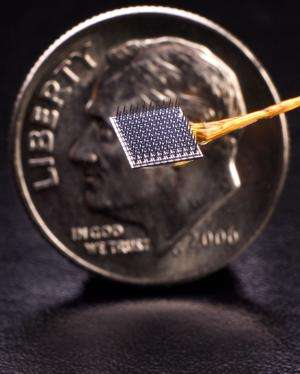February 11, 2014 weblog
Brain implants may help the injured who suffer memory loss

(Medical Xpress)—Focusing on ways to treat people who have suffered memory loss through head trauma, the Defense Advanced Research Projects Agency (DARPA) wants to examine possibilities for recovery by means of brain implants. Might such implants be the answer for wounded soldiers who suffer memory loss from trauma? That is an avenue of research being explored. Implantable probes may possibly reverse memory loss caused by brain injury. A research initiative would help those who were wounded recover "task-based motor skills" necessary for daily living. Geoff Ling, a physician and deputy director of DARPA's Defense Sciences Office, said brain implants might enable people to recall how to drive cars, tie their shoes and eventually operate machinery, according to a detailed report from Bloomberg about DARPA's interest in brain implants.
The government document, titled "Restoring Active Memory (RAM)," states that DARPA is looking for new methods for analysis and decoding of neural signals to understand how neural stimulation could be applied to facilitate recovery of memory encoding following brain injury. "Ultimately," said the document, "it is desired to develop a prototype implantable neural device that enables recovery of memory in a human clinical population. Additionally, the program encompasses the development of quantitative models of complex, hierarchical memories and exploration of neurobiological and behavioral distinctions between memory function using the implantable device versus natural learning and training."
DARPA is soliciting innovative research proposals for developing the neural device, to restore specific types or attributes of memories. They are looking toward companies and organizations for ideas. Those who submit proposals, said the Bloomberg report, will need to specify, among other details, the power requirements of the probes; they will also need to say the areas of the brain that would be targeted and surgical procedures used for implanting the device.
While the DARPA effort involves wounded troops, research outcomes could eventually transform options in treatment for the general population. "We strive to come up with projects that would ultimately be transformative," Ling said, in the Bloomberg report. The research, for example, could be helpful for treating the elderly with dementia or athletes with brain injuries.
The incidence of traumatic brain injury (TBI) in the U.S. military has been documented in over 250,000 cases between 2000 and mid-2012, and an estimated 1.7 million people are diagnosed with TBI in the United States each year. According to the DARPA Broad Agency Announcement, Restoring Active Memory (RAM), Defense Sciences Office, "TBI frequently results in impairment and dysfunction of memory, including the ability to retrieve memories formed prior to the injury and/or to form and retain memories of new experiences following injury onset. Advances in neuroengineering applications enabling memory restoration are critical for individuals with TBI."
More information:
www.fbo.gov/index?s=opportunit … 0d&tab=core&_cview=0
www.businessweek.com/news/2014 … t-memory-loss-health
© 2014 Medical Xpress













